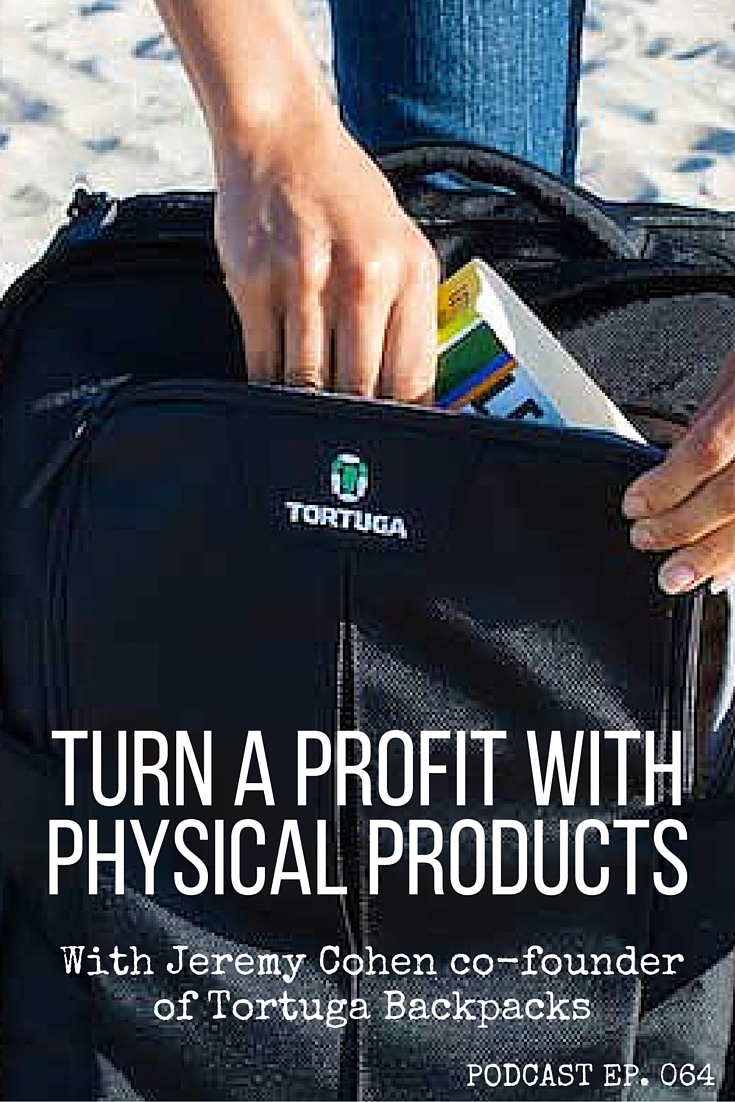RSS:Use this link in your RSS reader
In the Physical Products Podcast:
Jeremy Cohen is a co-founder at Tortuga Backpacks. This is now one of the most successful independent travel backpack companies on the market. But it took them 4 years to get there. Learn from there business development and mistakes as to how you should think about developing your own physical product – the do’s and don’ts.
Feature Topics in this episode:
- How do you know if your product has a market?
- How do you get your product in front of the right audience?
- Can you design the product yourself, if not, who do you call?
- What do you need to think about before choosing a manufacturer?
- What rookie mistakes do all first timers make?
6 Quick Tips for starting your own physical product business
Listen to the podcast to get more depth on these topics, as well as others. Plus, listening is more entertaining than reading anyway 😉
What problem does your product solve?
Where are the pain points that are going to make your product a necessity rather than just a maybe for consumers considering a purchase?
Look at the competition. What are they doing wrong?
Decide what you can improve to make your product better for potential customers so you can displace the competition.
If your product doesn’t offer a solution that improves upon what is currently available, then why should customers choose your product over a proven competitor?
Find your perfect customer avatar
Don’t build your product for a group of customers. Build it for one specific “ideal” customer. Michael Jordan is Nike’s ideal customer. Other customers want to be able to play sport like Michael Jordan, but Michael is the most demanding customer out there. If you can Nike can please him with their products, then all the other customers are going to be happy too.
Check your MOQ before you start getting a prototype made with a manufacturer
Once you are through the design phase and looking to get manufacturing, whoever you get to do the build must establish before you even begin with a prototype exactly what their MOQ is (Minimum Order Quantity).
If you are only doing a test run for your first batch, you may only want a few hundred units. If the factory will only produce an MOQ of 10,000 then you’ll waste months on building a prototype to discover that you have to start from scratch again with a smaller manufacturer.
Unless your product fits perfectly with your current blog, start a new blog
Having a content marketing strategy is important for an independent venture. How are you going to make people aware of your product?
If your product is not a perfect fit for your current blog, you may need to start a separate blog that can provide targeted information that your customers will want – and only that information, no filler.
Don’t go “all in” on your first ever venture
Quitting your job and investing all your money before you have proven revenue from a project is incredibly risky.
Unlike becoming a blogger, where you may just need time for learning and education to start making money online, for a physical product you generally need a good supply of capital.
Even with a kickstarted campaign, just because you get funded, doesn’t mean you should instantly quit your job.
Become part of the Travel Freedom community on twitter.
Tweet suggestions to @mytravelfreedom
#travelfreedom #travelthursdays #moneymondays
Weblinks from The Physical Products Podcast
World Nomads Insurance – Specifically designed for digital nomads, flashpackers, adventure & long term Travellers – Get a 5% Discount with our coupon code: FOOD5
Tortuga Backpack – Take a look at the product.
Asana – Team project management tool
4 Hour Work Week – Tim Ferris’ legendary book that has inspired many a digital entrepreneur.
Elance (Now called Upwork) – System for finding and managing outsourced staff
Skitch – for communicating in pictures
Tony Fadell – Designer of the iPod
Shopify – Ecommerce platform
Amazon – Will store, pack and distribute your product for you [AFFILIATE link to that service?)
Ship-wire – distribution fulfilment and storage service
Slack – Keep your team communicating. Messaging service for business teams.
Dropbox – Online cloud storage
Photos
Love this podcast? Why not pin it to your favourite business Pinterest board?
—-
DISCLAIMER: We are affiliated with, World nomads, – companies we love and support. Some other links may also be affiliate links – these links help support the podcast financially. All our opinions, as always, are our own.
WE NEED YOUR FEEDBACK
Please leave your comments below so that we can make changes to future episodes based on your feedback.








